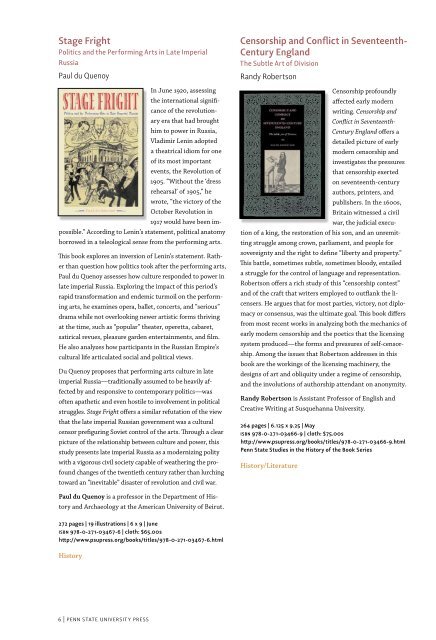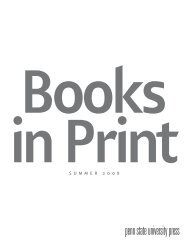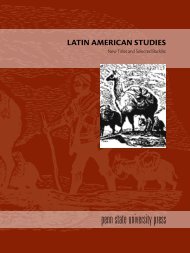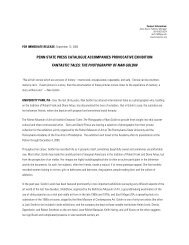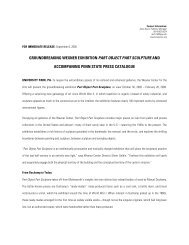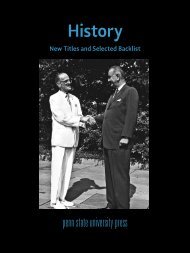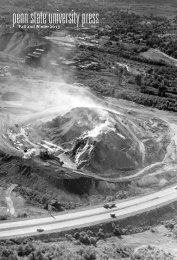penn state university press - Pennsylvania State University Press
penn state university press - Pennsylvania State University Press
penn state university press - Pennsylvania State University Press
You also want an ePaper? Increase the reach of your titles
YUMPU automatically turns print PDFs into web optimized ePapers that Google loves.
Stage Fright<br />
Politics and the Performing Arts in Late Imperial<br />
Russia<br />
Paul du Quenoy<br />
In June 1920, assessing<br />
the international significance<br />
of the revolutionary<br />
era that had brought<br />
him to power in Russia,<br />
Vladimir Lenin adopted<br />
a theatrical idiom for one<br />
of its most important<br />
events, the Revolution of<br />
1905. “Without the ‘dress<br />
rehearsal’ of 1905,” he<br />
wrote, “the victory of the<br />
October Revolution in<br />
1917 would have been impossible.”<br />
According to Lenin’s <strong>state</strong>ment, political anatomy<br />
borrowed in a teleological sense from the performing arts.<br />
This book explores an inversion of Lenin’s <strong>state</strong>ment. Rather<br />
than question how politics took after the performing arts,<br />
Paul du Quenoy assesses how culture responded to power in<br />
late imperial Russia. Exploring the impact of this period’s<br />
rapid transformation and endemic turmoil on the performing<br />
arts, he examines opera, ballet, concerts, and “serious”<br />
drama while not overlooking newer artistic forms thriving<br />
at the time, such as “popular” theater, operetta, cabaret,<br />
satirical revues, pleasure garden entertainments, and film.<br />
He also analyzes how participants in the Russian Empire’s<br />
cultural life articulated social and political views.<br />
Du Quenoy proposes that performing arts culture in late<br />
imperial Russia—traditionally assumed to be heavily affected<br />
by and responsive to contemporary politics—was<br />
often apathetic and even hostile to involvement in political<br />
struggles. Stage Fright offers a similar refutation of the view<br />
that the late imperial Russian government was a cultural<br />
censor prefiguring Soviet control of the arts. Through a clear<br />
picture of the relationship between culture and power, this<br />
study presents late imperial Russia as a modernizing polity<br />
with a vigorous civil society capable of weathering the profound<br />
changes of the twentieth century rather than lurching<br />
toward an “inevitable” disaster of revolution and civil war.<br />
Censorship and Conflict in Seventeenth-<br />
Century England<br />
The Subtle Art of Division<br />
Randy Robertson<br />
Censorship profoundly<br />
affected early modern<br />
writing. Censorship and<br />
Conflict in Seventeenth-<br />
Century England offers a<br />
detailed picture of early<br />
modern censorship and<br />
investigates the <strong>press</strong>ures<br />
that censorship exerted<br />
on seventeenth-century<br />
authors, printers, and<br />
publishers. In the 1600s,<br />
Britain witnessed a civil<br />
war, the judicial execution<br />
of a king, the restoration of his son, and an unremitting<br />
struggle among crown, parliament, and people for<br />
sovereignty and the right to define “liberty and property.”<br />
This battle, sometimes subtle, sometimes bloody, entailed<br />
a struggle for the control of language and representation.<br />
Robertson offers a rich study of this “censorship contest”<br />
and of the craft that writers employed to outflank the licensers.<br />
He argues that for most parties, victory, not diplomacy<br />
or consensus, was the ultimate goal. This book differs<br />
from most recent works in analyzing both the mechanics of<br />
early modern censorship and the poetics that the licensing<br />
system produced—the forms and <strong>press</strong>ures of self-censorship.<br />
Among the issues that Robertson addresses in this<br />
book are the workings of the licensing machinery, the<br />
designs of art and obliquity under a regime of censorship,<br />
and the involutions of authorship attendant on anonymity.<br />
Randy Robertson is Assistant Professor of English and<br />
Creative Writing at Susquehanna <strong>University</strong>.<br />
264 pages | 6.125 x 9.25 | May<br />
isbn 978-0-271-03466-9 | cloth: $75.00s<br />
http://www.psu<strong>press</strong>.org/books/titles/978-0-271-03466-9.html<br />
Penn <strong>State</strong> Studies in the History of the Book Series<br />
History/Literature<br />
Paul du Quenoy is a professor in the Department of History<br />
and Archaeology at the American <strong>University</strong> of Beirut.<br />
272 pages | 19 illustrations | 6 x 9 | June<br />
isbn 978-0-271-03467-6 | cloth: $65.00s<br />
http://www.psu<strong>press</strong>.org/books/titles/978-0-271-03467-6.html<br />
History<br />
6 | <strong>penn</strong> <strong>state</strong> <strong>university</strong> <strong>press</strong>


